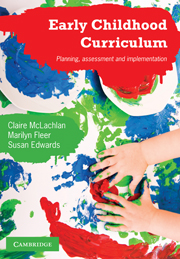Book contents
- Frontmatter
- Contents
- List of figures
- List of tables
- About the authors
- Acknowledgments
- Chapter 1 Introduction
- Chapter 2 Theory, research and the early childhood curriculum
- Chapter 3 Development and learning – how views of development shape how curriculum is framed
- Chapter 4 Curriculum as a cultural broker
- Chapter 5 Interpreting early childhood curriculum
- Chapter 6 Cultural-historical curriculum in action
- Chapter 7 Curriculum as a conceptual tool: Observation, content and programming
- Chapter 8 Assessing children and evaluating curriculum: Shifting lenses
- Chapter 9 Content knowledge: The sciences, maths and numeracy
- Chapter 10 Content knowledge: Language, literacy and ICT
- Chapter 11 Content knowledge: The arts and health, wellbeing and physical activity
- Chapter 12 Conclusions
- Index
Chapter 4 - Curriculum as a cultural broker
- Frontmatter
- Contents
- List of figures
- List of tables
- About the authors
- Acknowledgments
- Chapter 1 Introduction
- Chapter 2 Theory, research and the early childhood curriculum
- Chapter 3 Development and learning – how views of development shape how curriculum is framed
- Chapter 4 Curriculum as a cultural broker
- Chapter 5 Interpreting early childhood curriculum
- Chapter 6 Cultural-historical curriculum in action
- Chapter 7 Curriculum as a conceptual tool: Observation, content and programming
- Chapter 8 Assessing children and evaluating curriculum: Shifting lenses
- Chapter 9 Content knowledge: The sciences, maths and numeracy
- Chapter 10 Content knowledge: Language, literacy and ICT
- Chapter 11 Content knowledge: The arts and health, wellbeing and physical activity
- Chapter 12 Conclusions
- Index
Summary
This chapter highlights how early childhood practices are enacted in different cultural communities and related to curriculum decision-making processes. These examinations will be used to show how different curricula are informed by alternative perspectives on development and learning, and by their political contexts. A case study of teacher practice will be used to show how this process is related to a cultural-historical perspective. Research emerging from the use of cultural-historical theory as an informant of the early childhood curriculum will then be used to discuss curriculum as a cultural construction affecting a range of stakeholders, including teachers, families, children, communities and policy makers.
REFLECTION 4.1
In this chapter we will examine the issues raised by Kiri, Hui Lee and Mandy. Do you share their concerns?
Kiri: I don't see what all the fuss is about really, as we have two curriculum documents in my country that dictate what we should be doing anyway: Te Whāriki and the New Zealand Curriculum.
Hui Lee: In my context we only have one – Nurturing Early Learners. A framework for a kindergarten curriculum in Singapore.
Mandy: We have just had our first document developed. It is a national early years learning framework for Australia – Belonging, Being and Becoming. But each of our states and territories has its own curriculum as well.
Four-year-old Ava was very interested in Dora the Explorer. Ava had many of the Dora the Explorer DVDs and her preferred bedtime reading was usually a Dora the Explorer book.
- Type
- Chapter
- Information
- Early Childhood CurriculumPlanning, Assessment, and Implementation, pp. 51 - 62Publisher: Cambridge University PressPrint publication year: 2010



